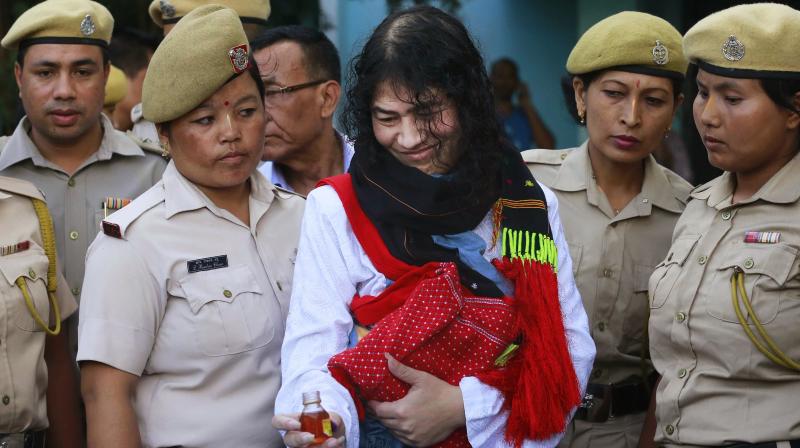Irom Sharmila, Acquitted By The Courts Of All 'Charges'

ITANAGAR: In a major symbolic victory for anti-AFSPA activists in Manipur and the rest of Northeast, an Imphal court today acquitted Irom Chanu Sharmila of all charges of attempting to commit suicide.
Sharmila had begun a fast unto death against the implementation of the Armed Forces (Special Powers) Act (AFSPA) in Manipur November 2000 after ten civilians were killed by security forces in Malom town at Imphal Valley.
Earlier this year in July, she announced that she would end her fast and on August 9, she broke her fast by consuming some honey. She also announced her plans to contest the next state elections. However, before taking any concrete steps she has been meeting other activists and the media and still faced charges for attempting to commit suicide for the past 15-plus years.
Today the Chief Judicial Magistrate of Imphal West, Lamkhanpau Tonsing, passed a judgement freeing Sharmila of all legal charges that she faced.
In his order, the CJM noted that the “prosecution (State of Manipur) as having failed to prove the charge against the accused person (Sharmila) of attempt to commit suicide under Section 309 IPC with the required evidence”.
The verdict also noted that the rights activist “is acquitted of the charge to commit suicide under Section 309 IPC” and that “all bonds executed in connection with this case are cancelled and discharged”.
The same judge had granted Sharmila bail on August 9 earlier.
"Now that I'm a free woman, I'll convene a new political party on October 10 to fight the coming election,” she reportedly told journalists in Imphal today.
Imphal-based human rights activist, Babloo Loitongbam of the Human Rights Alert, called it a “welcoming” verdict.
AFSPA has often been criticised for the way it allows security forces to act with impunity on mere suspicion and is currently implemented in the whole of Assam, Nagaland, Jammu & Kashmir, Manipur (except Imphal municipal area), Arunachal Pradesh’s Tirap, Changlang and Longding districts plus a 20-km belt bordering Assam, and Meghalaya’s 20-km area bordering Assam.
Meanwhile in New Delhi, Irom Sharmila who met a cross section of activists, women, journalists and others during a brief visit said, “My struggle will continue until AFSPA is struck down.” She was speaking at a press conference organised by the “Stand With Irom Sharmila: Repeal AFSPA” Campaign, a global campaign endorsed by nearly 1000 women - from pioneers of global women’s movements to grassroot activists who have dedicated their lives to the struggle for women’s rights and freedoms.
Sharmila re-asserted that draconian laws like AFSPA have no place in a democracy. Responding to the question of what her next political steps could be, Sharmila stated that “her first step has been to break out of the isolation imposed upon her by the State and now she is taking her campaign against AFSPA out to the people.It is not a matter of “I” now but of becoming a “we” a collective movement.”
Sharmila located her battle against AFSPA within her larger vision of working towards a political system that is clean and transparent, and governance based on equal respect for the multi-culturalism in India, irrespective of the belief systems of those in power. When asked how relevant she thought the demand to repeal AFSPA is in the current political context of the hostilities on the border, Sharmila was unshaken in her belief in the power of non-violence. “If I was the Prime Minister of India, I would ask the country to think with a cool mind. After all, the people of both countries have friends and relatives on both sides, Hindus and Muslims are on both sides, so negotiation and dialogue should definitely come before any retaliation.”
(File Photograph)



